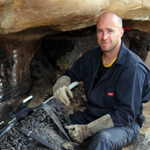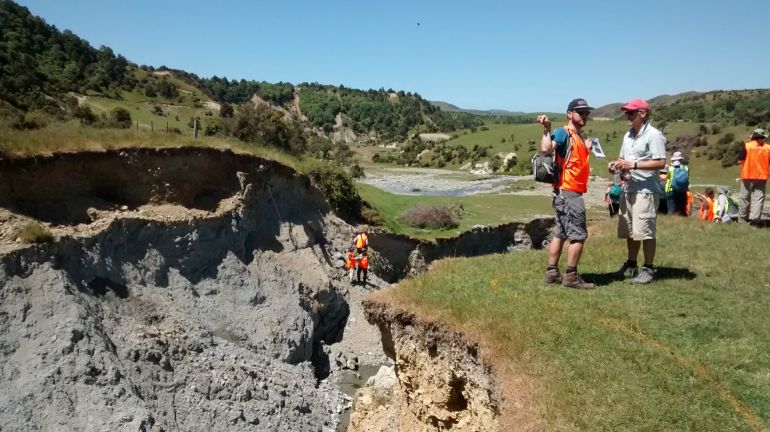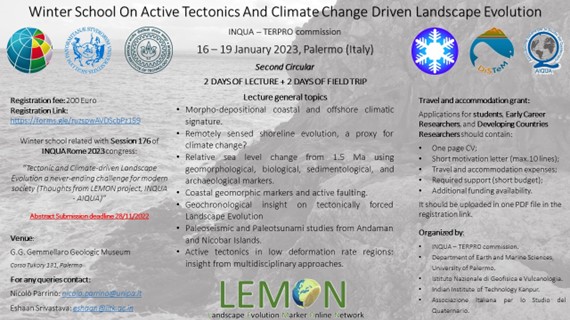Archived IFG
INQUA IFG 1608F Southern Hemisphere Assessment of Palaeo-Environments (SHAPE)

SHAPE is supporting international research collaborations aimed at investigating past environmental variability and change for Southern Hemisphere terrestrial, ocean and cryosphere regions using and integrating proxy data with model simulations.

Brian Chase
Institut Des Sciences De L'Evolution-Montpellier, UMR 5554, Centre National De La Recherche Scientifique, Université De Montpellier, Bat.22, CC061, Place Eugène Bataillon, 34095 Montpellier
Brian.Chase - replace w/character - umontpellier.frAndrew Lorrey
National Institute Of Water And Atmospheric Research, Auckland, New Zealand
[email protected]Steven Phipps
Climate Change Research Centre (CCRC) UNSW Australia, Sydney NSW 2052 Australia, University Of New South Wales, Sydney, Australia
[email protected]Maisa Rojas
Department Of Geophysics, Blanco Encalada 2002, Floor 4. Santiago, Chile, University Of Chile, Santiago, Chile
[email protected]Four Projects are currently part of the SHAPE IFG:
INQUA IFG Virtual Seminar Series Advances in Stratigraphy and Geochronology Virtual Seminar Series
The Stratigraphy and Chronology Commission (SACCOM) of INQUA is organizing a series of virtual talks on a diverse range of geochronology and stratigraphy topics during the coming Spring. These will be held live on Thursdays at 9 am USA EST, 2 pm London, 3 pm Paris, and 10 pm Beijing time. Please see the Zoom link below and most of the talks will be recorded. Please see the full program below:
April 22
Konstantinos Panagiotopoulos (University of Cologne, Germany)
"Vegetation and climate dynamics in southeastern Europe since the Early Pleistocene: a chronostratigraphical approach"
Flier for Talk 1: https://inqua.org/media/uploads/Flier%20for%20SACCOM%20Virtual%20Seminar%20Session%201.pdf
April 29
Sarah Finkelstein (University of Toronto, Canada)
“Biostratigraphy and chronology of sub-till organic-bearing deposits in the Hudson Bay Lowlands, Canada”
Flier for Talk 2: https://inqua.org/media/uploads/Flier%20SACCOM%20Talk%202.pdf
May 6
Pinkey Bisht (Wadia Institute of Himalayan Geology, India)
“Chronology and climatic implications of Late Quaternary glaciations in Central Himalaya with special focus in the upper Kali Ganga valley, Uttarakhand”
Flier for Talk 3: https://inqua.org/media/uploads/609e460f80726-Flier%20for%20SACCOM%20VIrtual%20Seminars_Pinkey%20Bisht.pdf
May 13
Leah Morgan (U.S. Geological Survey, USA)
“Tephrochronology by Ar/Ar: methods and applications in paleoanthropology”
Flier for Talk 4: https://inqua.org/media/uploads/Flier%20for%20SACCOM%20Virtual%20Seminars_Leah%20Morgan.pdf
May 20
Matthew Kirby (California State University Fullerton, USA)
“Re-visiting Lake Mojave Using a Basin Analysis Approach: Trying to Resolve a Complex History of Lake Level Change”
Flier for Talk 5: https://inqua.org/media/uploads/Flier%20for%20SACCOM%20VIrtual%20Seminars_Matthew%20Kirby.pdf
May 27
Tom Higham (University of Oxford, England)
“Improving chronology building of the Middle to Upper Palaeolithic of Eurasia”
Flier for Talk 6: https://inqua.org/media/uploads/Flier%20for%20SACCOM%20VIrtual%20Seminars_Thomas%20Higham.pdf
June 3
Quentin Simon (CEREGE, France)
“Atmospheric beryllium-10, a versatile cosmogenic nuclide for relative and radiometric dating”
Flier for Talk 7: https://inqua.org/media/uploads/Flier%20for%20SACCOM%20VIrtual%20Seminars_Quentin%20Simon.pdf
June 10
Bob Booth (Lehigh University, USA)
“Wetland and forest responses to Holocene moisture variability: insights from the peatland paleoenvironmental archive”
Flier for Talk 8: https://inqua.org/media/uploads/Flier%20for%20SACCOM%20VIrtual%20Seminars_Bob%20Booth.pdf
June 17
Kenneth Mertens (IFREMER, Concarneau, France)
Never mind the dinosaurs, here's the dinoflagellates
Flier for Talk 9: https://inqua.org/media/uploads/Flier%20for%20SACCOM%20VIrtual%20Seminars_Kenneth%20Mertens.pdf
(Overseen by Lewis Owen on behalf of SACCOM)
INQUA IFG 2008F TPPT (Terrestrial Processes Perturbed by Tectonics)
***IFG TPPT WAS ACTIVE IN THE 2019-2023 INTERCONGRESS PERIOD***

We all live on a planetary surface shaped by terrestrial geoprocesses. This topic has been much in the news lately due to the increase in extreme meteorological events, attributed by some to global climate change. But crustal volcanism and active tectonics also influence terrestrial geoprocesses. These crustal processes make the news only when a large earthquake or eruption occurs, but the events soon drop from the news and people forget about them. However, their secondary effects on terrestrial geoprocesses continue. Our proposed IFG “Terrestrial Processes Perturbed by Tectonics” (TPPT) will support studies of the longer-term effects of tectonic events on geomorphic systems, and contrast them with effects of non-seismic forcing such as extreme meteorological events and slower climate change.
Project 2009P : EDITH – From Earthquake DeformatIon to Seismic Hazard Assessment
Project 2009P details
INQUA IFG 2010F HYPEDAE: PalaeoHYdrological, -PEDological and -AEolian processes shaping Quaternary landscapes
***IFG HYPEDAE WAS ACTIVE IN THE 2019-2023 INTERCONGRESS PERIOD***
This IFG focuses on continental environments, where the Quaternary evolution has been mainly driven by depositional and erosive phases, varying in time and space, and alternating with less dynamic periods, allowing for soil formation. The associated dynamic processes are recorded in various kinds of geomorphic landforms and deposits, e.g., fluvial, lacustrine, colluvial and eolian sediments, as well as erosional discontinuities. Previous topographic surfaces may get removed, buried or dismantled. On the other hand, the periods of relative geomorphological stability are documented by fossil soils (palaeosols). Their erosion or burial marks the onset of another dynamic phase. The complexity of these geomorphological-sedimentological-palaeopedological archives is further increased, as the associated hydrological, pedological and aeolian processes are not independent from each other: Surface processes related to the hydrological cycle are among the main forces shaping a landscape. The available moisture is also a major factor in the formation of soils and their characteristics, and it is of paramount importance in controlling the production of dust. Dust in the atmosphere in turn plays an important role in climate dynamics.
In the present situation, with rapid climate change, a profound understanding of how surface processes work, how they interact, and how they respond to climatic variations, is of utmost importance. Thus, a comprehension of the earth surface dynamics and its drivers over the Quaternary is a key issue of this IFG. Thereby, our goals are (1) to stimulate progress in each of the involved disciplines, i.e. palaeohydrology, aeolian dust research and palaeopedology, and (2) to bring these disciplines together, e.g. at interdisciplinary conference sessions and workshops to promote the interdisciplinary interpretation of complex continental archives. The IFG has a global perspective but also considers regional and local scales, where representative case studies are carried out and ground truth can be obtained. The time frame of interest encompasses the whole Quaternary up to recent times, with a multidisciplinary approach that includes remote sensing, field work, laboratory analyses, numerical modelling and simulations.
The planned meeting of FLAG in Moscow in September 2020 has been cancelled due to Coronavirus and re-scheduled for September 2021.
INQUA IFG Project 2204: LEMON Landscape Evolution Markers Online Network
***PROJECT LEMON WAS ACTIVE IN THE 2019-2023 INTERCONGRESS PERIOD***

Low Strain Rate regions (LSRr), regions deforming at a rate less than 1 mm/yr, are the most widespread areas worldwide. The fact that tectonic deformation occurs not only along the edges, but also inside continental plates is widely accepted nowadays by the scientific community. The tectonic forcing magnitude is stronger enough to trigger significant but infrequent earthquakes in such areas, but not enough to overprint the climatic forcing signature. This peculiar feature makes these regions perfect natural laboratories to analyze how the onshore and offshore landscape evolution (LE) relates to climate and tectonic forcings, both in active and not-active settings.
Several important cities and infrastructures are located in LSRr, and therefore, seismic and climate hazards of these regions are two of the significant challenges that modern societies need to face. Considering this, many authors in the last decades tried to understand how the tectonic and climatic forgings drive the LE and how we could use such information to assess the climatic change and seismic related hazards. These authors focused on how a) climate change influenced erosion and sedimentation rates, b) erosion and sedimentation rates link to the LE in active tectonic areas, and c) erosion and sedimentation products could allow understanding how and how much tectonic and climatic forcing drive LE.
Considering the above, we believe that the analysis of these regions deserves particular attention. Therefore, with this project, we want to pose to the INQUA community following questions:
1. How does landscape evolution relate to tectonics and climate in onshore and offshore LSRr?
2. Which are the most meaningful markers to understand this relationship?
We aim to pursue this research going beyond the physical limit of the coastline through quantitative analyses of erosion and sedimentation rates and forms, which we recognize as triggered by tectonic or climate processes. We want to estimate erosion and sedimentation rates and compare them with fault slip rates and climatic change curves, paleoseismological analyses, faults slip, and tsunami modelling.
We will analyze different LSRr case histories, initially selecting study areas in Italy (Sicily, Po Plain) and India (Gujarat), eventually extending also to other LSRr areas, to try to answer the scientific questions we posed. Outcomes from each analyzed case-history will get organized in the form of datasets and interpretations useful for publishing into high priority peer-reviewed journals. We also target the development of an open-access WebGIS database for storing the most valuable markers, potentially useful for the understanding of the climate and tectonic forcing on the landscape evolution. The data will be acquired in several areas both from the case histories of this project and from the literature. We support the open-data cause and, thus, we will build a community-driven WebGIS in which every researcher can contribute. Doing this, we will facilitate the data exchange between the scientific community of INQUA.
The project will promote most of its ideas and activities by using websites besides the pages of INQUA. Our specific transmission tools are also other leading social networks (e.g., Twitter, Instagram) to be able to engage with the community and disseminate the findings of the working group. We have also scheduled online meetings during which we will monitor the participants in terms of gender, career stage and nationality. We will use all suggestions and guidance available to encourage minorities to participate in all the research activities and to give oral presentations.
Leaders:
- Nicolò Parrino (Palermo, Italy: [email protected])
INQUA IFG 2004F Terminations Five to Zero (T5-0)
Over the last ~450,000 years, the Earth went through five deglaciations, i.e. transitions from a glacial to an interglacial state, also termed “glacial terminations”. During these deglaciations, the concentration of atmospheric CO2, a powerful greenhouse gas, increased by 80 to 100 ppm and air temperature at high latitudes rose by 10 to 15 °C, leading to a melting of continental ice-sheets, thus raising global sea-level by 100 to 130 m. Deglaciations lasted about 10,000 years, but the changes did not occur gradually. Instead, they occurred in bursts lasting decades to centuries, and were usually associated with significant changes in oceanic circulation. While our understanding of these deglaciations has significantly improved over the last 20 years, the sequence of events that led to these deglaciations is still unclear. Particularly, there is a lack of information on the feedbacks linking the different components of the Earth’s system, i.e. the interaction between ice-sheets, climate, ocean circulation and carbon cycle.
Due to anthropogenic emissions of carbon, the atmospheric CO2 concentration has increased to an unprecedented level of 415 ppm in 2019, from its “natural” interglacial level of 280ppm. This will undoubtedly have a large impact on the different components of the Earth System over the coming centuries, including melting of the Greenland and Antarctic ice sheets, and subsequent global sea-level rise. The knowledge gained from our understanding of the processes and feedbacks involved in the last five glacial terminations will help estimate the rate of future climate change.
The goal of the IFG on Terminations 5-0 is to bring together scientists with different expertise (e.g. experts on marine and lake sediment records, ice core records, cave deposits, and sea-level with ice sheet, climate and carbon cycle modelers) to i) improve our understanding of the sequence of events occurring during the last five terminations, and ii) highlight key processes and feedbacks within the Earth system that lead to abrupt changes.
Contact: Ruza Ivanovic [email protected]
Project 2005P : Glacial terminations: processes and feedbacks
Project 2005P details
INQUA IFG 2112 The whole is not the sum of the parts: building a synthesis database of past human-environmental systems in the Global South (pSESYNTH)
This project is a community-driven effort resulting from the joint PAGES-INQUA early-career researcher workshop “ Past Socio-Environmental Systems” (PASES), and is led by Xavier Benito (IRTA, Spain), Charuta Kulkarni (UK) and Ignacio Jara (CEAZA, Chile). The team project is composed of more than 20 researchers from different parts of the world acting as regional coordinators of the Global South. pSESYNTH has the overarching objective to build the first ever multi-theme database of past socio-environmental systems from the Global South. A biased understanding of long-term human-environmental dynamics can mislead our responses to pressing environmental issues of similar magnitude and nature in the most developing countries. Therefore, our project will shed light into the multivariate relationships among climate, environment, and cultural evolution for testing multiple hypotheses of widespread cultural “stress” and human resilience to climate change. Our mission is to consolidate research collaborations among who should be the next-generation leaders in the field.
Timeline of activities
At the short term (January through June 2022), pSESYNTH will explore what processes, handed in by project participants through datasets, allow us to infer past drivers using a multiproxy approach, organized into three themes: paleoecological (e.g., pollen, charcoal, aquatic indicators), paleoclimatic (e.g., speleothems, lake sediments, tree-rings), and archaeological (e.g., radiocarbon dates, burial sites, material culture). Participants will explore how to link these three sources with special emphasis on trajectories of change of the human component: when, where and how past societies evolved. At the long-term (July 2022 through June 2023), pSESYNTH will capitalize on existing single- and multi-themed databases (e.g., Neotoma, NOAA, LinkedEarth, CARD, ArchaeoGlobe, HYDE 3.2) to ensure accessibility for data standards, usability, and comparability with the newly generated multi-thematic database. Furthermore, it will focus on software integration (relation al database) linked to Geographic Information Systems (GIS) to provide users with an interactive web interface, allowing them to pinpoint what location and time period contain available datasets, thereby helping identify gaps for future studies and avenues for collaborations.
Contact and further information
Central to pSESYNTH is to reach out to the broader INQUA and PAGES to invite them to collaborate. Visit the website ( https://www.pases2020.com/index.php/psesynth-project/) for further information and the registration form to sign up as a project member.
